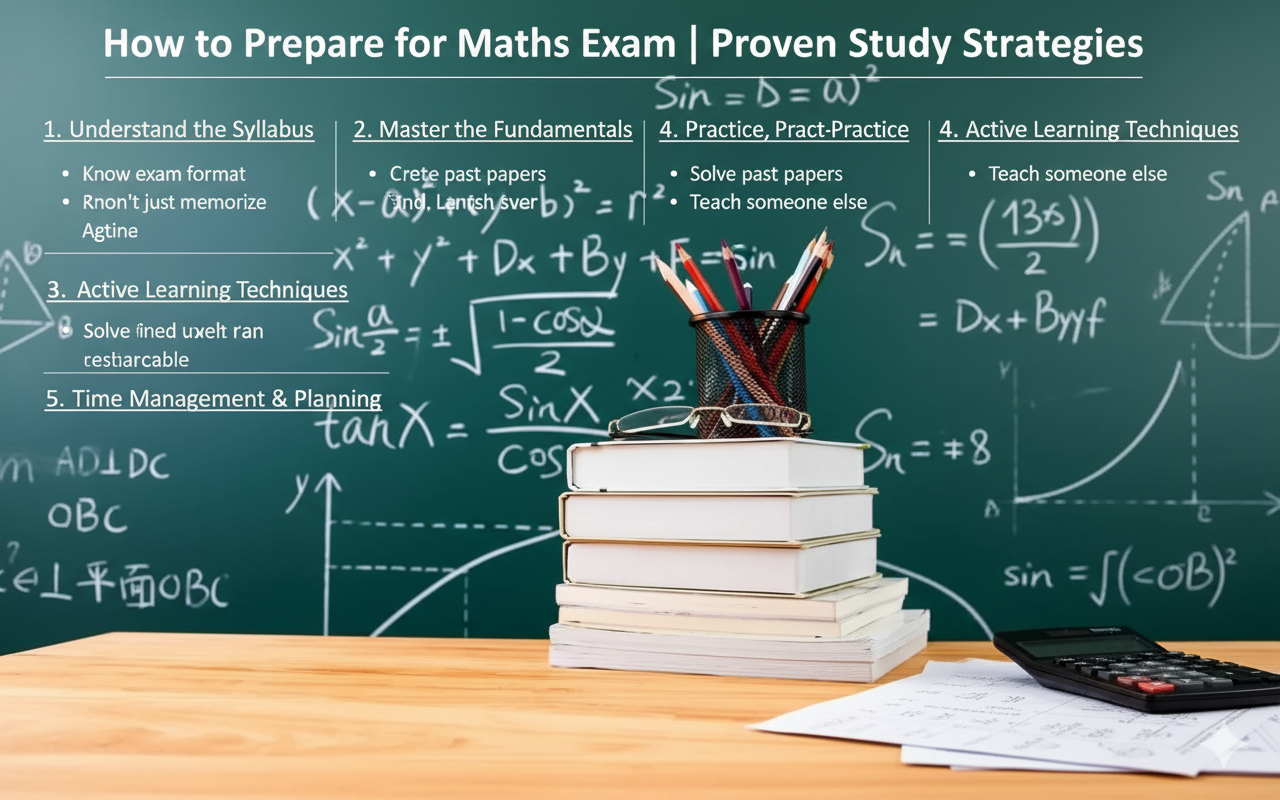How to Prepare for Maths Exam can feel overwhelming, especially if you’re sitting for a GCSE, A-Level, SAT, university test, or competitive exam.Preparing for a maths exam can feel overwhelming, whether you’re sitting for GCSE, A-Level, SAT, university, or competitive exams. Unlike subjects that rely heavily on memorization, maths demands conceptual understanding, logical reasoning, and consistent practice.
The good news? With the right plan, you can build confidence, reduce stress, and maximize performance. This guide shares expert tips, proven strategies, and study resources. If you’re preparing for other challenging subjects, check out these MCAT Biology practice questions or explore the best collaboration tools for online learning to enhance your study routine.
 1. Understand Your Battlefield: Decoding the Exam
1. Understand Your Battlefield: Decoding the Exam
A. Know Your Exam Board and Syllabus
The first step is to get clarity on exactly what you need to study. Each exam board (AQA, Edexcel, OCR, or SAT’s College Board) publishes a syllabus and marking scheme. Download them and note:
-
Topics with highest weight
-
Common question types
-
Skills examiners expect
For example, AQA’s GCSE Maths syllabus clearly breaks down algebra, geometry, and statistics segments.
B. Learn the Exam Format
Use past papers to understand:
-
Which questions allow a calculator
-
The balance between short and long answers
-
Graphs, diagrams, or applied problems
Familiarity with the format helps reduce surprises on exam day.
C. Diagnose Strengths and Weaknesses
Take a diagnostic test covering all topics. Note which areas you excel in and which need improvement.
This helps you target your study rather than randomly revisiting everything.
2. Build a Rock-Solid Foundation: Conceptual Mastery
A. Go Beyond Memorization
Maths isn’t about recalling formulas—it’s about understanding why they work. When you grasp the underlying reasoning, you can adapt to unfamiliar questions.
B. Systematically Review Key Topics
Divide your syllabus into segments such as:
-
Algebra & functions
-
Geometry & trigonometry
-
Probability & statistics
-
Calculus (if applicable)
Rotate through weaker topics while refreshing your stronger ones to maintain balance.
C. Active Recall & Formula Sheets
-
Create flashcards for key formulas and theorems
-
Use spaced repetition tools like Anki
-
Maintain a one-page formula sheet for quick revision
3. Sharpen Your Skills: Practice & Problem Solving
A. Use Past Papers Religiously
Past exam papers are your best training ground. Sit them under exam conditions (timed, minimal aids) to build stamina, accuracy, and speed.
B. Break Down Tough Problems
When you face a hard problem:
-
Break into small sub-steps
-
Work methodically
-
Show every line of your working — even if your final answer is wrong, you may still gain method marks
C. Maintain a Mistake Log
Every time you make an error, record:
-
The nature of the mistake
-
The reason (conceptual, careless, time pressure)
-
How to avoid it next time
Review the log weekly so you don’t repeat the same errors.
D. Master Your Calculator
For exams that allow calculators (SAT, A-Level), learn all shortcuts: graphing, memory storage, quick functions. Efficiency here saves precious minutes.
4. Study Smarter: Strategies & Time Management
A. Structure Your Study Time
-
Allocate blocks for concept review and practice
-
Use the Pomodoro method (25 mins study, 5 mins break)
-
As the exam nears, shift to full past papers
B. Use Effective Learning Techniques
-
Active recall (self-quizzing) rather than passive reading
-
Interleaving (mix topics in each session)
-
Mind maps or diagrams to visualize relationships
C. Leverage Online Resources
Make use of high-quality platforms:
-
Khan Academy — tutorials and practice
-
BBC Bitesize — GCSE Maths support
-
Brilliant.org — focused problem solving
D. Peer Learning & Tutors
Study groups help you teach and test each other. If certain topics remain difficult, a tutor can provide tailored help.
Also, if you’re exploring other subjects or domains (e.g. biology or study tools) feel free to check out internal resources like MCAT biology practice questions at safasolo.com or best collaboration tools for online learning at safasolo.com. These can expand your learning approach or support cross-subject study techniques.
5. The Mental Game: Confidence & Managing Pressure
A. Cultivate a Growth Mindset
Believe that maths ability improves with effort. This mindset encourages persistence and reduces fear of failure.
B. Control Test Anxiety
-
Practice deep breathing or short mindfulness exercises
-
Avoid last-minute cramming
-
Ensure 7–8 hours of good sleep before exam day
C. Take Care of Your Body
-
Eat balanced meals
-
Keep hydrated
-
Move or stretch between study sessions
D. The Evening Before & Exam Day
-
Revisit only essential formulas
-
Pack essentials: pens, calculator, ID, water
-
Arrive early to compose yourself
6. Post-Exam Reflection: Learn and Improve
After the exam, take time to evaluate:
-
Which questions were hardest and why
-
Where mistakes came from , concept gaps, misreading, rushing
-
What you should do differently next time
This reflection ensures continuous improvement.
7. Special Section: Preparing for the 11+ Maths Exam
For students aiming at the 11+:
-
Focus on arithmetic, logic, word problems
-
Use targeted practice books like Bond 11+ or CGP
-
Practice under timed conditions to build speed and accuracy
8. FAQs: How to Prepare for Maths Exam
Q1: How can I prepare fast?
Study key formulas, focus on weak topics, and solve timed past questions.
Q2: How to score full marks?
Consistent effort, error analysis, and double-checking answers.
Q3: What to do the night before?
Sleep early, lightly revise essentials, and stay calm.
Q4: How to prepare for GCSE Maths in particular?
Use your exam board’s past papers (AQA, Edexcel, OCR), revision sites like BBC Bitesize, and build exam familiarity.
Q5: How do I deal with maths anxiety?
Break tasks into manageable chunks, practice daily, and build confidence through small wins.
Final Thoughts
Mastering how to prepare for maths exam takes more than just effort, it requires a strategic plan, consistent practice, and a positive mindset. Start with the syllabus, strengthen your conceptual foundations, practice past papers, and reflect after each exam to keep improving.
For students exploring broader academic growth, resources like MCAT Biology practice questions can sharpen scientific problem-solving, while tools from the best collaboration platforms for online learning can make group study more effective.


Leave a Reply